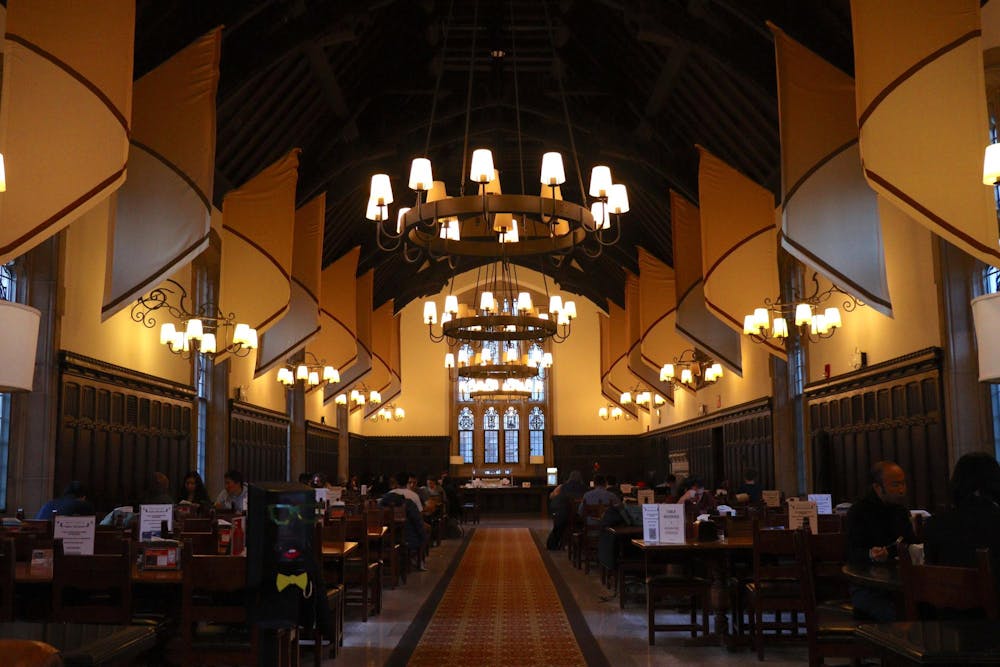Students with medical dietary needs and significant allergies discussed challenges with dining on campus in a Feb. 5 roundtable hosted by the Princeton Food Allergy and Celiac Team for University Advocacy and Living (FACTUAL). The group had a wide-ranging discussion on cross contamination, tagging food items, and the centrality of food and dining to campus culture.
According to Ana Villada ’24, the biggest issue is a "lack of knowledge or awareness from other students" surrounding the current dining hall accommodations.
Current dining hall practice should involve generating “a menu tag that identifies each of the top nine allergens — milk, eggs, fish, crustacean shellfish, tree nut, peanut, wheat, soybeans, and sesame — as well as gluten, coconut, alcohol, and halal,” according to a food allergy brochure by Campus Dining.
However, the menu tag does not appear for all food items in the dining hall, according to FACTUAL. Villada, who has an anaphylactic allergy to seafood, said that she wished sauces could also have a list of allergens. She noted that “sometimes [tags] won’t [list] allergens, and fish tends to be in a lot of sauces, [which] people don’t realize.” As a result, she said that she usually avoids eating sauces, unless she is certain it will be safe to consume.
Villada is both on the dining plan and a member of the Cap and Gown Club. While she did not initially prioritize finding an eating club that would serve allergy-friendly food during her Bicker process, she does wish she had spoken up and asked more questions. Nevertheless, she told the ‘Prince’ that she still would have joined her current eating club.
Potential cross-contamination is also a huge issue, Villada and others present at the panel said.
“There can be serious consequences for cross contact,” Rachel Brooks ’25 said in an interview, citing the risks of hospitalization and anaphylaxis. “If we can educate students on this issue, so that they can be more aware and conscious of what they’re doing when they’re grabbing their food, even that simple shift really changes things for individuals who have these dietary needs.”
Villada pointed to the salad dressing station and the use of ladles instead of enclosed bottles as an example of cross-contact. “Most of the time, kids end up spilling it over other dressings, which means I can’t have them,” she told the ‘Prince.’ She also mentioned the impact of having allergic food in the vicinity to other foods.

“The other week, there was this piece of chicken, and there was like a piece of fish next to it. And it seems like people were using the same utensil for both, so I just didn’t get the chicken,” Villada recalled.
Students with multiple sets of dietary restrictions may also face additional challenges. “What does it look like if you’re thinking about religious dietary requirements or cultural practices, in addition to having something like a food allergy or other types of specialty diets?” Brooks asked.
Vincent Sanfedele ’27, a member of FACTUAL, spoke to the ‘Prince’ about the impact of the repetitiveness of menu options. For days when the main entrees contain many allergens, he typically resorts to staple items such as grilled chicken. “It is not necessarily a problem, but it would be nice to always have options,” he told the ‘Prince.’
Socially, Sanfedele doesn’t believe that his dining hall experience is heavily affected by his having allergies. He pointed instead to the larger group events that have food that can sometimes isolate people with common food allergies. He spoke highly of his Zee group functions, where his RCA has been “very helpful in terms of addressing my food allergies and being able to provide those additional snacks.” However, he also mentioned the difficulty of finding allergy-friendly options at Butler Teahive, a weekly gathering of people from Butler College to enjoy treats from local small businesses and relax with friends.

Brooks also discussed “reframing different events so that food is not necessarily so intertwined with everything, because for individuals who do have these medical dietary restrictions, food is such a different component of their lives.” University events from guest lectures to study breaks are frequently accompanied by free food and snacks.
During the discussion, Donna Pilenza, the director of residential dining, mentioned including a potential allergy-free zone in the dining hall of Hobson College, projected to be completed by Spring 2027. This would keep specific staff members, utensils, and cooking vessels strictly in that zone, free of the major allergens. Sanfedele showed excitement about the plan, and told the ‘Prince’ that it would allow people who are currently getting meals separately-made to experience the dining hall culture, due to the decreased chance of cross-contact.
Justin Tam is a staff News writer for the ‘Prince.’
Please send any corrections to corrections[at]dailyprincetonian.com.








